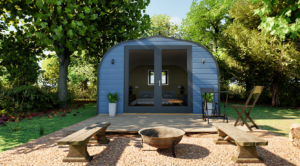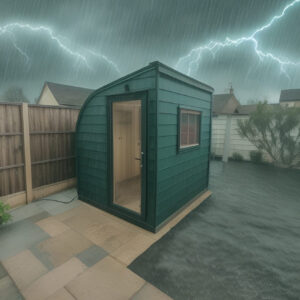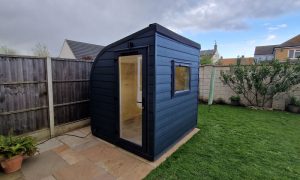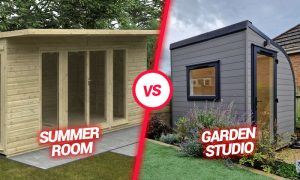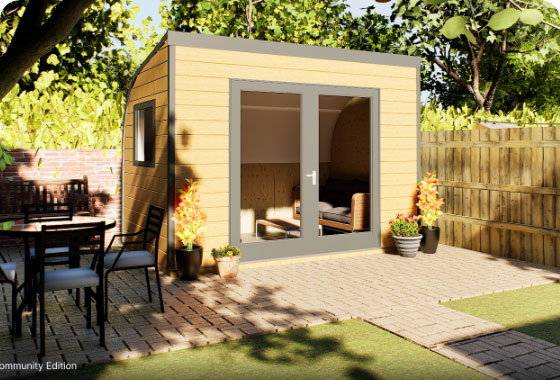
Save Money Working From Home with a Garden Office Pod
The Rise of Hybrid and Remote Working
While the debate over remote working and office working rages on, it cannot be denied that more employers are continuing to support the concept of flexible or hybrid working.
Increased inflation can lead to a wage price spiral. The more expensive everyday living becomes, the greater employees’ expectations to receive a corresponding increase in their salary. Savvy employers are beginning to realise that they can maximise staff recruitment by offering contractual perks outside of pay. As employment opportunities arise and businesses are finding that positions remain vacant for longer, any opportunity to encourage recruitment whilst saving on salaries appears to be in vogue.
With remote working or working from home having clear advantages in terms of mental health, more family time and, in certain circumstances, increased productivity, the concept of hybrid working is likely to remain for some time.
The Challenges of Working From Home
Yes, there are possible downsides to working from home. A perceived lack of social interaction with colleagues and the opportunity to be ever present may lead to more opportunities for promotion. However, as working from home grows through its early stages of infancy, these issues are more likely to be tackled in a productive manner and with a conciliatory tone.
Garden Office vs House Extension: Cost Comparison
For many considering remote working, the option of hybrid work is limited due to a lack of available working space in the home. They will have to consider the additional cost of house renovations or a house extension. A typical cost of a single floor annex could be anywhere between £35,000 to £70,000 as part of a traditional build.
Another popular and more financially realistic option is the installation of a garden office or office pod. While the quality and cost of these garden builds vary considerably, there are a large number of products that are ideal. The team at My Garden Studio are able to produce a wide range of bespoke garden office pods to suit your space and budget.
Our popular eSnug range starts with a 2m x 2.2m garden office pod at just £8,900 for a full turnkey project. Built to last with high-quality materials, year-round insulation, and energy-efficient design, you will certainly get great value for your initial investment.
How Much Can You Save by Working From Home?
But just how much can you save by working from home with a garden office? With an average family car costing £160 to fill, the weekly commute is a time-consuming and expensive concern. A survey of 2,000 full-time UK workers by Moneybarn, a leading vehicle finance provider, identified that on average, workers spend 62 minutes each day and 23 miles on a round trip. 15% of commuters are travelling more than 42 miles each day!
In optimum driving conditions this could cost between £130 to £190 per month in fuel on a five-day week and 20 hours of lost commuting time each month. This is before considering parking fees and depreciation costs on your vehicle.
Finance Your Garden Office Pod
With My Garden Studio, you can offset the initial cost of your garden office build with flexible finance options. We offer 0% interest and fixed-rate plans to make your garden office affordable. This represents a significant saving on fuel costs alone when compared to daily commuting expenses.
Energy Efficiency: Keeping Utility Costs Low
Another concern for those working from home is the incredible increase in utility costs. Having to light and heat the house is a significant reason why some employees prefer to be in the office. However, it doesn’t have to be this way with an insulated garden office pod.
Our fully insulated garden studios feature 100mm insulation in walls, floors, and roofs to stay warm in the winter and cool in the summer. Better still, our complementary low-energy LED lighting only requires 20w to power the entire system. With a cost of around 50p per kw/h, it should cost no more than 13p to run the lights for ten hours a day!
All our garden office pods include WiFi-controlled heating as standard, allowing you to manage energy costs efficiently whilst maintaining year-round comfort.
Return on Investment: Garden Office Pods
If you are willing to accept the initial investment costs, you will certainly recover them in the medium term. And in the longer term, having a garden office pod that has been well constructed with real longevity in the design gives an additional option of selling it on or taking it with you should you move.
Our garden studios are designed to last 30+ years, backed by a 10-year structural warranty, 40-year roof warranty, and 10-year cladding warranty. This makes them a sound capital investment that adds value to your property.
The Financial Benefits of a Garden Office
A shrewd capital investment in a garden office pod can save you time and money on your commute, reduce your utility costs, and provide a healthy resale value should you require it.
Taking a leap into remote working is not just about mental wellbeing and time with your family. It also makes real financial sense!
Ready to start your garden office project? Get a free quote today and discover how much you could save by working from home.
